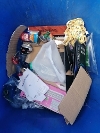Waste Free - Recycling
Managing Extra Waste at Home
With many of us now spending more time at home it might be an idea to try and manage the amount of waste being created in your household. We've put together a list of tips, advice and ideas that might help keep your bin from over-flowing.
Blue or Green Bin Overflowing?
Know your collection days
You can check your collection days, sign up to email reminders, download a pdf calendar or download dates straight to the calendar on your phone.
Maximise space in your bin

- Flat pack, fold or rip up your cardboard boxes into smaller pieces.
- Scrunch up any large sheets of paper, e.g. wrapping paper into small balls.
- If you can, carefully flatten or scrunch cans - be careful, the metal can be sharp!
- After you've rinsed your plastic bottles and cartons, take the lid off and try to squash the air out them, pop the lid back on to ensure they don't re inflate!
- Try to choose products that have less packaging, this will encourage manufacturers to change the way they package their products.
- You can push down the material in your bin slightly to create some space but try not to compact it too much.
Please do not leave any extra waste on the street at the side of your bin as this won't be uplifted.
Make sure you're recycling the right waste in your bin
Have a look at our blue bin only page or the blue and green bin page depending on the type of collection you have, for more information about what you can and can't put in your recycling bins and please ensure that all items

Remember that although items can be recycled they don't all go in the recycling bins at home and some common misconceptions can take up valuable space in your bin! For example:
- Clothes should be taken to a textile bank
- Unwanted hard plastic toys can be taken to a charity shop
- Electrical items can also be fully recycled however not in any of your bins at home, hang on to them until your next visit to the recycling centre.
Please do not place batteries in any of your bins as they can cause fires when compacted in bin lorries and at recycling centres! Most supermarkets have collection points for used batteries, so you could drop them off when you go for your weekly shop.
Take your recycling to your local Community Recycling Centre
Excess recycling can be taken to any of our five Community Recycling Centres.
Locations and opening hours for recycling centres can be found on the Community Recycling Centre Locations page. Please remember to book a slot before visiting a recycling centre.
Please also be aware that sites will likely be busy when you visit and you may have to queue to access the site. Please therefore consider whether your visit can wait until a quieter time, but if you do visit, please be mindful of other road users while you wait to access the site.
Safely store your waste until your bin is emptied

Please remember to store your extra recycling safely and be considerate of your neighbours when storing the waste. If you live in a flat, please don't store any recyclables in stairwells or landings as this can block access and ignites easily, which can become a serious fire risk.
Ensure that you also store your extra waste in a dry location as it can't be recycled if it gets wet and do not leave waste at the side of your bin or on streets as it won't be collected.



